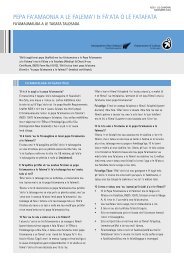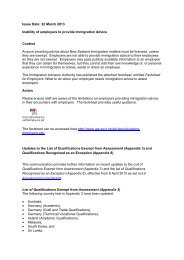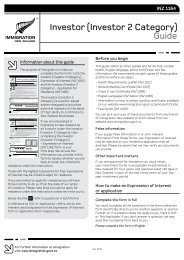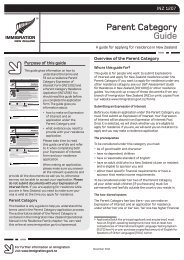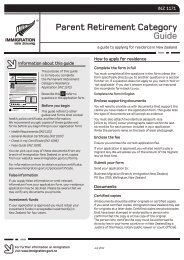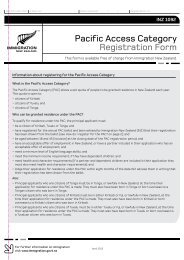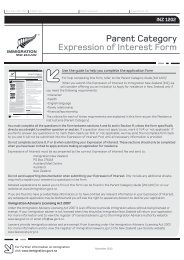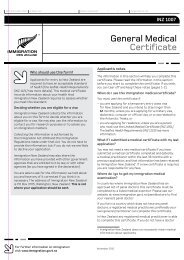Review of Essential Skills in Demand Lists - Immigration New Zealand
Review of Essential Skills in Demand Lists - Immigration New Zealand
Review of Essential Skills in Demand Lists - Immigration New Zealand
You also want an ePaper? Increase the reach of your titles
YUMPU automatically turns print PDFs into web optimized ePapers that Google loves.
<strong>Review</strong> <strong>of</strong> <strong>Essential</strong> <strong>Skills</strong> <strong>in</strong> <strong>Demand</strong> <strong>Lists</strong><br />
Submission Form<br />
The Department <strong>of</strong> Labour 1 has selected occupations to be reviewed<br />
on the basis <strong>of</strong> an Occupation Nom<strong>in</strong>ation process, which closed on<br />
18 May 2012.<br />
Submissions will only be accepted <strong>in</strong> relation to the selected<br />
occupations. Please refer to the list <strong>of</strong> occupations be<strong>in</strong>g reviewed,<br />
attached as an appendix to this form.<br />
When complet<strong>in</strong>g this submission form, it is important that you refer<br />
to the Prelim<strong>in</strong>ary Evidence Indicator Report (PIER) prepared by the<br />
Department <strong>of</strong> Labour for the relevant occupation. PIERs for each <strong>of</strong><br />
the occupations under review are on the website<br />
www.immigration.govt.nz/essentialskills.<br />
Key dates<br />
25 June 2012: Submissions open<br />
5pm 20 July 2012: Submissions close<br />
Enquiries and submissions<br />
All enquiries and submissions should be directed to:<br />
Email: shortagesreview@dol.govt.nz<br />
Mobile: 027 232 3801 (Peter Leniston)<br />
1 From 1 July 2012 the M<strong>in</strong>istry <strong>of</strong> Bus<strong>in</strong>ess, Innovation and Employment will take over all exist<strong>in</strong>g functions <strong>of</strong> the<br />
Department <strong>of</strong> Labour.<br />
1
Background<br />
<strong>Review</strong> <strong>of</strong> <strong>Essential</strong> <strong>Skills</strong> <strong>in</strong> <strong>Demand</strong> <strong>Lists</strong><br />
Submission Form<br />
The Department <strong>of</strong> Labour’s Policy and Research Group ma<strong>in</strong>ta<strong>in</strong>s the <strong>Essential</strong> <strong>Skills</strong> <strong>in</strong><br />
<strong>Demand</strong> (ESID) <strong>Lists</strong>: the Immediate Skill Shortage List (ISSL); and the Long Term Skill<br />
Shortage List (LTSSL). Each list performs a particular immigration policy function, and<br />
potential migrants use both lists to understand where the opportunities for work lie <strong>in</strong> <strong>New</strong><br />
<strong>Zealand</strong>.<br />
The lists can be accessed at www.immigration.govt.nz/essentialskills.<br />
Objectives <strong>of</strong> the <strong>Essential</strong> <strong>Skills</strong> <strong>in</strong> <strong>Demand</strong> <strong>Lists</strong><br />
The ESID lists <strong>of</strong>fer one avenue through which employers may recruit skilled migrants 2 to<br />
work <strong>in</strong> <strong>New</strong> <strong>Zealand</strong>. In broad terms, the lists are designed to facilitate the entry <strong>of</strong><br />
appropriately skilled migrants to fill skill shortages and to reduce costs and time delays for<br />
employers seek<strong>in</strong>g staff. However, this objective must be balanced by the need to ensure<br />
that there are no suitably qualified <strong>New</strong> <strong>Zealand</strong> citizens or resident workers available to<br />
undertake the work, and that the shortage is 'genu<strong>in</strong>e'.<br />
An occupation may be considered for <strong>in</strong>clusion on the list provided that:<br />
� there are no suitable <strong>New</strong> <strong>Zealand</strong> citizens or resident workers available to undertake<br />
the work<br />
� terms and conditions <strong>in</strong> the <strong>New</strong> <strong>Zealand</strong> labour market are not underm<strong>in</strong>ed<br />
� development opportunities for <strong>New</strong> <strong>Zealand</strong>ers are not underm<strong>in</strong>ed<br />
� a genu<strong>in</strong>e skill shortage exists, and that it is not a recruitment or retention problem<br />
� the government’s education, tra<strong>in</strong><strong>in</strong>g, employment and economic development policies<br />
are supported<br />
� prevail<strong>in</strong>g and anticipated labour market conditions are taken <strong>in</strong>to account, and<br />
� the skills shortage exists across the occupation, despite attempts by <strong>in</strong>dustry to tra<strong>in</strong><br />
and attract <strong>New</strong> <strong>Zealand</strong>ers to available jobs.<br />
The ESID lists are not designed for lower skilled labour shortages or seasonal labour<br />
shortages. Nor are they <strong>in</strong>tended to address recruitment and retention problems aris<strong>in</strong>g<br />
because the <strong>in</strong>dustry cannot, or does not, meet the terms and conditions necessary to<br />
recruit sufficient numbers <strong>of</strong> suitably qualified workers from with<strong>in</strong> the <strong>New</strong> <strong>Zealand</strong><br />
workforce.<br />
The lists are reviewed every year to ensure that they meet the needs <strong>of</strong> the chang<strong>in</strong>g labour<br />
market.<br />
The Immediate Skill Shortage List<br />
The Immediate Skill Shortage List (ISSL) is for skilled occupations that have an immediate<br />
shortage <strong>of</strong> workers <strong>in</strong> <strong>New</strong> <strong>Zealand</strong>. It is designed to facilitate the approval <strong>of</strong> temporary<br />
work visa applications. If an applicant produces an <strong>of</strong>fer <strong>of</strong> employment and meets<br />
qualification and work experience requirements for an occupation that is <strong>in</strong>cluded on the<br />
2 A skilled occupation is def<strong>in</strong>ed as hav<strong>in</strong>g an ANZSCO skill level classification <strong>of</strong> level 1, 2 or 3. More <strong>in</strong>formation<br />
on ANZSCO can be found here: www.immigration.govt.nz/anzsco.<br />
2
<strong>Review</strong> <strong>of</strong> <strong>Essential</strong> <strong>Skills</strong> <strong>in</strong> <strong>Demand</strong> <strong>Lists</strong><br />
Submission Form<br />
current ISSL, immigration <strong>of</strong>ficers will accept that no suitably qualified <strong>New</strong> <strong>Zealand</strong> citizens<br />
or residents are available.<br />
The ISSL is grouped by the follow<strong>in</strong>g regions:<br />
� Auckland/Upper North Island<br />
� Waikato/Bay <strong>of</strong> Plenty<br />
� Central North Island (<strong>in</strong>clud<strong>in</strong>g Taranaki and Manawatu)<br />
� Well<strong>in</strong>gton<br />
� Canterbury/Upper South Island<br />
� Otago and Southland.<br />
The Long Term Skill Shortage List<br />
The Long Term Skill Shortage List (LTSSL) identifies those skilled occupations where there is<br />
an absolute (susta<strong>in</strong>ed and ongo<strong>in</strong>g) shortage <strong>of</strong> workers <strong>in</strong> <strong>New</strong> <strong>Zealand</strong> and globally.<br />
People who ga<strong>in</strong> employment <strong>in</strong> one <strong>of</strong> these areas may be granted a work visa under the<br />
LTSSL Work to Residence policy. The Work to Residence policy enables an applicant to apply<br />
for residence after two years, provided that they have rema<strong>in</strong>ed work<strong>in</strong>g <strong>in</strong> a LTSSL<br />
occupation with a base salary <strong>of</strong> at least NZ$45,000 and meet standard policy requirements.<br />
Candidates for residence under the Skilled Migrant Category who have an <strong>of</strong>fer <strong>of</strong><br />
employment, work experience or qualifications <strong>in</strong> an area <strong>of</strong> absolute skill shortage identified<br />
on the LTSSL, will ga<strong>in</strong> bonus po<strong>in</strong>ts towards their application for residence.<br />
Alternative work visa policies<br />
Employers may br<strong>in</strong>g <strong>in</strong> migrant workers for occupations not listed on the ISSL and LTSSL,<br />
provided suitable <strong>New</strong> <strong>Zealand</strong>ers are not available. Other policies that may be used <strong>in</strong>clude<br />
the Skilled Migrant Category and Talent (Accredited Employers) Policy for permanent<br />
residence, and temporary work policies such as <strong>Essential</strong> <strong>Skills</strong> Policy.<br />
Employers want<strong>in</strong>g to recruit from overseas are encouraged to visit the <strong>Immigration</strong> <strong>New</strong><br />
<strong>Zealand</strong> website www.immigration.govt.nz.<br />
3
ESID review process<br />
<strong>Review</strong> <strong>of</strong> <strong>Essential</strong> <strong>Skills</strong> <strong>in</strong> <strong>Demand</strong> <strong>Lists</strong><br />
Submission Form<br />
The Department <strong>of</strong> Labour’s (the Department) process for review<strong>in</strong>g the ESID lists is<br />
summarised below:<br />
1) Occupation Nom<strong>in</strong>ations<br />
The Department calls for <strong>in</strong>dustry stakeholder proposals for occupations to be reviewed.<br />
The clos<strong>in</strong>g date for Occupation Nom<strong>in</strong>ation for the current review was 5pm, 18 May 2012.<br />
2) Selection <strong>of</strong> occupations to be reviewed<br />
The Department assesses the Occupation Nom<strong>in</strong>ation proposals and selects occupations to<br />
be reviewed. The Department may also identify occupations that it wishes to review as a<br />
result <strong>of</strong> its own <strong>in</strong>telligence gather<strong>in</strong>g. As a general rule, occupations identified by <strong>in</strong>dustry<br />
stakeholders will take precedence, and the Department will provide the balance <strong>of</strong><br />
occupations for review. A list <strong>of</strong> the occupations selected for the current review is<br />
attached as an appendix to this form.<br />
3) Publication <strong>of</strong> Prelim<strong>in</strong>ary Indicator Evidence Reports (PIERs)<br />
The Department prepares a Prelim<strong>in</strong>ary Indicator Evidence Report (PIER) for each<br />
occupation selected to be part <strong>of</strong> the review. The PIER collates relevant statistical data<br />
about the occupation and provides a prelim<strong>in</strong>ary view on the status <strong>of</strong> the occupation. The<br />
PIERs for this review have been published on www.immigration.govt.nz/essentialskills.<br />
4) Call for Submissions on occupations selected for review<br />
Submissions are sought from <strong>in</strong>dustry groups and others about the nature and extent <strong>of</strong> skill<br />
shortages <strong>in</strong> their occupational sett<strong>in</strong>g, as they relate to the selected occupations. The<br />
submission process for this review beg<strong>in</strong>s on 25 June 2012 and concludes at 5pm on 20<br />
July 2012.<br />
5) Wider sector consultation on occupations<br />
Once submissions are received, the Department (us<strong>in</strong>g an <strong>in</strong>dependent contractor 3 ) will<br />
undertake any further follow-up with submitters, consultation with government agencies and<br />
<strong>in</strong>dustry, and additional data analysis that may be required to <strong>in</strong>form decisions on any<br />
changes to the LTSSL and ISSL. The consultation process overlaps with the submission<br />
process and will conclude on 30 July 2012.<br />
6) Decisions taken and published<br />
Where there is consensus that an immediate skill shortage exists, the Department will<br />
recommend that the occupation be added to the ISSL. Where there is a demonstrated<br />
absolute (susta<strong>in</strong>ed and ongo<strong>in</strong>g) and global long term skill shortage, the Department will<br />
recommend that the occupation is added to the LTSSL. There may be cases where the<br />
Department does not consider the lists to be the most appropriate response to the shortage,<br />
and may recommend an alternative solution.<br />
F<strong>in</strong>al decisions will be published on the Department’s website <strong>in</strong> December 2012. Please<br />
note that the decisions taken will result <strong>in</strong> changes to the ESID lists.<br />
3 Currently Peter Leniston.<br />
4
The Submission process<br />
<strong>Review</strong> <strong>of</strong> <strong>Essential</strong> <strong>Skills</strong> <strong>in</strong> <strong>Demand</strong> <strong>Lists</strong><br />
Submission Form<br />
What is the purpose <strong>of</strong> the submission process?<br />
The Department <strong>of</strong> Labour has selected occupations to review for the ESID lists. Most <strong>of</strong><br />
these occupations have been proposed by <strong>in</strong>dustry stakeholders through the Occupation<br />
Nom<strong>in</strong>ation process. The Department may also identify occupations that it wishes to review,<br />
as a result <strong>of</strong> its own <strong>in</strong>telligence gather<strong>in</strong>g.<br />
The Department has prepared Prelim<strong>in</strong>ary Indicator Evidence Reports (PIERs) for each<br />
occupation under review. These reports draw together statistical data about the occupation<br />
around three <strong>in</strong>dicators – skill levels, scale <strong>of</strong> the occupation, and evidence <strong>of</strong> shortage. On<br />
the basis <strong>of</strong> this <strong>in</strong>formation, the Department has formed a view on the status <strong>of</strong> the<br />
occupation. This view is expressed on the front page <strong>of</strong> the PIER.<br />
The PIER for each occupation be<strong>in</strong>g reviewed is available on the Department’s website<br />
www.immigration.govt.nz/essentialskills.<br />
Who can make a submission?<br />
The submission process is an opportunity for stakeholders to provide additional <strong>in</strong>formation<br />
and (potentially) different perspectives on the nature and extent <strong>of</strong> skill shortages <strong>in</strong><br />
occupations selected for review. Stakeholder submissions are a vital source <strong>of</strong> <strong>in</strong>formation,<br />
help<strong>in</strong>g to <strong>in</strong>form the Department’s f<strong>in</strong>al assessment <strong>of</strong> the status <strong>of</strong> occupations.<br />
Submissions should be made by coord<strong>in</strong>ated groups and <strong>in</strong>dustry stakeholders (for example,<br />
employer’s groups, trade unions and <strong>in</strong>dustry tra<strong>in</strong><strong>in</strong>g bodies) and should represent the<br />
shared views <strong>of</strong> those groups and stakeholders. You must show evidence <strong>of</strong> consultation as<br />
part <strong>of</strong> your submission.<br />
Note: the submitters <strong>of</strong> the orig<strong>in</strong>al Occupation Nom<strong>in</strong>ation are also expected to<br />
provide further <strong>in</strong>formation through the submission process – this may add to the<br />
case presented and/or respond to the PIER prepared by the Department.<br />
Where a review <strong>of</strong> an occupation has been <strong>in</strong>itiated through the Occupation<br />
Nom<strong>in</strong>ation process and subsequently no submissions are received, the<br />
Department will not cont<strong>in</strong>ue with the review process.<br />
Information requirements<br />
The <strong>in</strong>formation that you provide is important to our assessment process. You are<br />
encouraged to be as specific and detailed as possible when provid<strong>in</strong>g <strong>in</strong>formation.<br />
We would like to receive <strong>in</strong>formation that provides more detail <strong>in</strong> relation to the <strong>in</strong>dicators<br />
reported <strong>in</strong> the PIER. You may have more up-to-date evidence or other data (for example<br />
<strong>in</strong>dustry surveys or reports).<br />
We are also <strong>in</strong>terested <strong>in</strong> any other factors that you consider make it appropriate to add or<br />
remove an occupation from the lists. For example, you may have <strong>in</strong>formation on<br />
recruitment and retention difficulties or trends <strong>in</strong> relevant tra<strong>in</strong><strong>in</strong>g.<br />
What will happen to the submissions?<br />
5
<strong>Review</strong> <strong>of</strong> <strong>Essential</strong> <strong>Skills</strong> <strong>in</strong> <strong>Demand</strong> <strong>Lists</strong><br />
Submission Form<br />
The Department, us<strong>in</strong>g the services <strong>of</strong> an <strong>in</strong>dependent contractor, will consider all<br />
submissions received with<strong>in</strong> the stated timeframe. The contractor will undertake any<br />
necessary follow-up with submitters and consultation with government agencies and<br />
<strong>in</strong>dustry groups.<br />
At the end <strong>of</strong> the consultation process, the contractor will advise the Department <strong>of</strong> the<br />
outcomes <strong>of</strong> the review. The Department will then make recommendations about each <strong>of</strong><br />
the occupations to the Head <strong>of</strong> <strong>Immigration</strong> (for ISSL) and to the M<strong>in</strong>ister <strong>of</strong> <strong>Immigration</strong><br />
(for the LTSSL).<br />
6
<strong>Review</strong> <strong>of</strong> <strong>Essential</strong> <strong>Skills</strong> <strong>in</strong> <strong>Demand</strong> <strong>Lists</strong><br />
Submission Form<br />
Submission Form<br />
Please complete this form if you would like to make a submission <strong>in</strong><br />
respect <strong>of</strong> one <strong>of</strong> the occupations currently be<strong>in</strong>g reviewed by the<br />
Department <strong>of</strong> Labour. (The list <strong>of</strong> occupations under review is attached as<br />
an appendix to this form)<br />
Please complete a separate submission form for each occupation.<br />
Information provided by stakeholders forms a critical part <strong>of</strong> the review process and<br />
complements the statistical data <strong>in</strong> the Provisional Indicator Evidence Reports (PIERs).<br />
Please refer to the relevant PIER for the occupation you are <strong>in</strong>terested <strong>in</strong> – all<br />
PIERs are available at www.immigration.govt.nz/essentialskills.<br />
Please answer all questions. Incomplete submissions will not be processed.<br />
Please note that the boxes will auto-extend to accommodate your responses. You may wish<br />
to add support<strong>in</strong>g documents <strong>in</strong> addition to the <strong>in</strong>formation supplied <strong>in</strong> this form. These<br />
may be attached as PDFs.<br />
Disclosure<br />
Please note that the <strong>in</strong>formation provided <strong>in</strong> this submission will be made available to<br />
<strong>in</strong>terested parties on request. This is to promote maximum transparency and to encourage<br />
the exchange <strong>of</strong> <strong>in</strong>formation between all stakeholders who contribute to the review process.<br />
If the submission, or some <strong>of</strong> its content, is provided to others for the purposes <strong>of</strong><br />
<strong>in</strong>formation shar<strong>in</strong>g and/or consultation, personal contact details will be treated <strong>in</strong><br />
confidence.<br />
Information held by the Department, <strong>in</strong>clud<strong>in</strong>g the <strong>in</strong>formation provided <strong>in</strong> this form, is<br />
<strong>of</strong>ficial <strong>in</strong>formation under the Official Information Act 1982. Accord<strong>in</strong>gly, if a request is<br />
made for <strong>in</strong>formation under that Act, the Department may be required to release this<br />
<strong>in</strong>formation.<br />
Occupational statistics collected dur<strong>in</strong>g the course <strong>of</strong> the review may be used by the<br />
Department for other research purposes, but <strong>in</strong>dividual employers will not be identified.<br />
Enquiries and submissions<br />
All enquiries and submissions should be directed to:<br />
Email: shortagesreview@dol.govt.nz<br />
Mobile: 027 232 3801 (Peter Leniston)<br />
7
<strong>Review</strong> <strong>of</strong> <strong>Essential</strong> <strong>Skills</strong> <strong>in</strong> <strong>Demand</strong> <strong>Lists</strong><br />
Submission Form<br />
1. Background and contact <strong>in</strong>formation<br />
1a) Who is this submission on behalf <strong>of</strong>?<br />
Provide name <strong>of</strong> <strong>in</strong>dividual, firm, or other organisation<br />
<strong>New</strong> <strong>Zealand</strong> Space Programme (NZSP) - Eng<strong>in</strong>eer<strong>in</strong>g (Hydroponics) Division<br />
This is a co-ord<strong>in</strong>ated stakeholder response with the follow<strong>in</strong>g organisations be<strong>in</strong>g<br />
consulted:<br />
� University <strong>of</strong> Paeroa (Contact: Bill Green - b.green@paeroa.ac.nz)<br />
� Union <strong>of</strong> Space Eng<strong>in</strong>eers (Contact: Sam White - sam.white@use.co.nz)<br />
� Lunar Explorations NZ Ltd (Contact: Ann Brown – abrown@lunar.net.nz)<br />
� <strong>New</strong> <strong>Zealand</strong> Lunar Occupations Association (Contact: Tim Black –<br />
tim@nzloa.co.nz)<br />
� Hydroponics Eng<strong>in</strong>eers (NZ Charter) (Contact: George Grey –<br />
geogray@hydroponics.net.nz)<br />
� Space Explorers Trade Union (Contact: Brian Blue – bblue@setu.co.nz)<br />
1b) Contact details<br />
Include phone, email and postal addresses<br />
A Mann, Human Resources Advisor<br />
<strong>New</strong> <strong>Zealand</strong> Space Programme<br />
PO Box 123456, Well<strong>in</strong>gton<br />
A.Mann@nzsp.govt.nz<br />
04 999 0001 (phone)<br />
1c) Disclosure<br />
Please confirm that you have read and agree to the terms <strong>of</strong> the disclosure statement,<br />
below.<br />
Disclosure statement:<br />
a. The <strong>in</strong>formation conta<strong>in</strong>ed <strong>in</strong> this submission, or some <strong>of</strong> its content, may<br />
be provided to others for the purpose <strong>of</strong> <strong>in</strong>formation shar<strong>in</strong>g and /or<br />
consultation. If this is the case, personal contact details (<strong>in</strong>dividual<br />
names, telephone numbers and email addresses) will be treated <strong>in</strong><br />
confidence.<br />
b. The <strong>in</strong>formation provided <strong>in</strong> this form is <strong>of</strong>ficial <strong>in</strong>formation under the<br />
Official Information Act 1982 and, accord<strong>in</strong>gly, the Department <strong>of</strong> Labour<br />
may be required to release this <strong>in</strong>formation if a request is made under<br />
that Act.<br />
c. Occupational statistics collected dur<strong>in</strong>g the course <strong>of</strong> the review may be<br />
used by the Department <strong>of</strong> Labour for other research purposes, but<br />
8
<strong>Review</strong> <strong>of</strong> <strong>Essential</strong> <strong>Skills</strong> <strong>in</strong> <strong>Demand</strong> <strong>Lists</strong><br />
Submission Form<br />
<strong>in</strong>dividual employers will not be identified.<br />
I have read and agree to the terms <strong>of</strong> this disclosure statement.<br />
Name: A Mann<br />
1d) Briefly describe the ma<strong>in</strong> activity and characteristics <strong>of</strong> the organisation<br />
mak<strong>in</strong>g the submission<br />
If a firm, please describe ma<strong>in</strong> bus<strong>in</strong>ess activity and number <strong>of</strong> employees; if another<br />
organisation, please describe your organisation’s purpose, functions and membership<br />
size.<br />
If you are mak<strong>in</strong>g this submission as an <strong>in</strong>dividual, please briefly <strong>in</strong>dicate your<br />
<strong>in</strong>terest <strong>in</strong> the occupation your submission relates to.<br />
The <strong>New</strong> <strong>Zealand</strong> Space Programme is a Crown agency who is responsible for <strong>New</strong><br />
<strong>Zealand</strong>'s civilian space programme as well as aerospace research. The Eng<strong>in</strong>eer<strong>in</strong>g<br />
(Hydroponics) Division are responsible for the lunar hydroponics programme. More<br />
<strong>in</strong>formation can be found on the agency’s website (www.nzspaceprogramme.govt.nz).<br />
2. What occupation does this submission refer to?<br />
2a) Occupation job title and ANZSCO code<br />
Please give the job title and 6-digit ANZSCO code (refer to the relevant PIER).<br />
233999 Eng<strong>in</strong>eer<strong>in</strong>g Pr<strong>of</strong>essionals – Lunar hydroponics eng<strong>in</strong>eer<br />
3. What ESID list status do you th<strong>in</strong>k this occupation should have?<br />
3a) What ESID list status do you propose this occupation should have?<br />
Retention on the ISSL<br />
Addition to the ISSL<br />
Removal from the ISSL<br />
Transfer from ISSL to LTSSL<br />
9<br />
Retention on the LTSSL<br />
Addition to the LTSSL<br />
Removal from the LTSSL<br />
Transfer from LTSSL to ISSL<br />
3b) Does your proposal relate to the whole <strong>of</strong> <strong>New</strong> <strong>Zealand</strong> or only some<br />
regions? (ISSL only)<br />
Please tick all that apply:<br />
Certa<strong>in</strong> regions only:<br />
Auckland/Upper North Island
<strong>Review</strong> <strong>of</strong> <strong>Essential</strong> <strong>Skills</strong> <strong>in</strong> <strong>Demand</strong> <strong>Lists</strong><br />
Submission Form<br />
Waikato/Bay <strong>of</strong> Plenty<br />
Central North Island (<strong>in</strong>clud<strong>in</strong>g Taranaki and Manawatu)<br />
Well<strong>in</strong>gton<br />
Canterbury/Upper South Island (<strong>in</strong>clud<strong>in</strong>g Westland)<br />
Otago and Southland<br />
All <strong>of</strong> <strong>New</strong> <strong>Zealand</strong><br />
3c) Give your reasons for the proposed change to the ESID lists<br />
In 3 or 4 sentences please briefly summarise the major reasons for your proposal.<br />
Note: If you have already provided an Occupation Nom<strong>in</strong>ation to the Department, you<br />
may wish to copy the <strong>in</strong>formation provided <strong>in</strong> response to Question 4(c) on the<br />
Occupation Nom<strong>in</strong>ation form.<br />
<strong>New</strong> <strong>Zealand</strong>’s foray <strong>in</strong>to space has begun relatively recently. Our Space Programme<br />
(NZSP) is only four years old and one particular emerg<strong>in</strong>g area is lunar hydroponics.<br />
Over the next ten years, we will need 100 lunar hydroponics eng<strong>in</strong>eers to fill new and<br />
emerg<strong>in</strong>g positions.<br />
Currently there is one programme be<strong>in</strong>g <strong>of</strong>fered by <strong>New</strong> <strong>Zealand</strong> by the University <strong>of</strong><br />
Paeroa <strong>in</strong> lunar hydroponics. However, this programme is only four years old and only a<br />
small number <strong>of</strong> people graduate <strong>in</strong> any given year.<br />
Our organisations have attempted to recruit lunar hydroponics eng<strong>in</strong>eers <strong>in</strong> <strong>New</strong> <strong>Zealand</strong><br />
but there is only a small group <strong>of</strong> graduates and most travel to larger space programmes<br />
overseas.<br />
4. Information and data relevant to the review<br />
We would particularly like to receive <strong>in</strong>formation that provides more detail <strong>in</strong> relation to the<br />
<strong>in</strong>dicators reported <strong>in</strong> the PIER. Please refer to the relevant PIER when complet<strong>in</strong>g<br />
this section.<br />
It is important that the <strong>in</strong>formation that you provide is as specific and robust as possible.<br />
Please provide details about the source <strong>of</strong> your <strong>in</strong>formation, how many employers or<br />
<strong>in</strong>dividuals it represents (e.g. survey <strong>of</strong> 30 employers) and when the <strong>in</strong>formation was<br />
obta<strong>in</strong>ed (e.g. survey undertaken <strong>in</strong> March 2012).<br />
As a general guide, the Department is look<strong>in</strong>g for evidence that has a reasonable breadth<br />
<strong>of</strong> coverage across the <strong>in</strong>dustry (i.e. represents the views or situation <strong>of</strong> a reasonable<br />
proportion <strong>of</strong> employers and/or employees and/or tra<strong>in</strong>ers or other stakeholders); and is<br />
specific (i.e. clearly stated facts).<br />
Evidence should be able to be substantiated <strong>in</strong> some way, for example sourced to a<br />
survey, adm<strong>in</strong>istrative data, or employer/employee feedback collated over time.<br />
Information that does not meet these standards may not be sufficient to support<br />
your case.<br />
10
<strong>Review</strong> <strong>of</strong> <strong>Essential</strong> <strong>Skills</strong> <strong>in</strong> <strong>Demand</strong> <strong>Lists</strong><br />
Submission Form<br />
Additional material may be attached on a separate sheet, if necessary. Where you are<br />
append<strong>in</strong>g detailed reports or other <strong>in</strong>formation please cite these under the relevant<br />
head<strong>in</strong>gs below.<br />
4a) Skill level<br />
Please note any comments that you wish to make on the skill section <strong>of</strong> the relevant<br />
PIER.<br />
We confirm that the qualification and experience requirements mentioned <strong>in</strong> the PIER are<br />
appropriate (ie Masters degree <strong>in</strong> Lunar Hydroponics AND experience <strong>in</strong> space travel<br />
<strong>in</strong>clud<strong>in</strong>g a m<strong>in</strong>imum <strong>of</strong> 2 space walks undertaken with<strong>in</strong> the past two years).<br />
However, we feel that an additional requirement should be added - Lunar Registration<br />
with the <strong>New</strong> <strong>Zealand</strong> M<strong>in</strong>istry <strong>of</strong> Space Exploration.<br />
Wages<br />
To be <strong>in</strong>cluded on the LTSSL, average ord<strong>in</strong>ary time full-time earn<strong>in</strong>gs <strong>in</strong> the occupation<br />
must be at least $45,000 per annum. What evidence can you provide that earn<strong>in</strong>gs for<br />
this occupation reach or exceed $45,000 per annum?<br />
Please provide details <strong>of</strong> the source and robustness <strong>of</strong> this <strong>in</strong>formation.<br />
As described further <strong>in</strong> the submission, the beg<strong>in</strong>n<strong>in</strong>g salary for a grade 1 lunar<br />
hydroponics eng<strong>in</strong>eer is from $100,000 with a grade 3 hydroponics eng<strong>in</strong>eer earn<strong>in</strong>g up<br />
to $250,000. Please f<strong>in</strong>d attached <strong>in</strong>formation on salaries – this <strong>in</strong>formation has come<br />
from our records and key stakeholders (ie Lunar Explorations NZ Ltd; <strong>New</strong> <strong>Zealand</strong><br />
Lunar Occupations Association; Hydroponics Eng<strong>in</strong>eers (NZ Charter); Space Explorers<br />
Trade Union).<br />
4b) Scale<br />
Please provide any <strong>in</strong>formation that may be relevant concern<strong>in</strong>g the ‘scale’ <strong>of</strong> the<br />
occupation. This could <strong>in</strong>clude <strong>in</strong>formation on the total number <strong>of</strong> people employed <strong>in</strong><br />
this occupation <strong>in</strong> <strong>New</strong> <strong>Zealand</strong>, or the number <strong>of</strong> work visas your organisation or its<br />
members have sought.<br />
Please note any other comments that you wish to make on the scale section <strong>of</strong> the<br />
relevant PIER.<br />
At present, there are 300 lunar hydroponics eng<strong>in</strong>eers work<strong>in</strong>g <strong>in</strong> <strong>New</strong> <strong>Zealand</strong>. Over the<br />
next ten years, we will need 100 lunar hydroponics eng<strong>in</strong>eers to fill new and emerg<strong>in</strong>g<br />
positions <strong>in</strong> the NZSP, the University <strong>of</strong> Paeroa and the <strong>New</strong> <strong>Zealand</strong> M<strong>in</strong>istry <strong>of</strong> Space<br />
Exploration. An analysis <strong>of</strong> data has shown that the number <strong>of</strong> people be<strong>in</strong>g <strong>of</strong>fered work<br />
visas has <strong>in</strong>creased every year s<strong>in</strong>ce 2005 (see attached).<br />
4c) Shortage<br />
Please refer to the shortage section <strong>of</strong> the relevant PIER. We are <strong>in</strong>terested <strong>in</strong> your<br />
response to the <strong>in</strong>formation provided, as well as any additional <strong>in</strong>formation (such as<br />
<strong>in</strong>dustry surveys and reports) you can provide.<br />
Describe and provide any additional evidence you have on the question <strong>of</strong> shortage.<br />
For example, if you consider that there is an occupational shortage:<br />
� evidence <strong>of</strong> difficulties employers are hav<strong>in</strong>g recruit<strong>in</strong>g staff (depend<strong>in</strong>g on the<br />
11
<strong>Review</strong> <strong>of</strong> <strong>Essential</strong> <strong>Skills</strong> <strong>in</strong> <strong>Demand</strong> <strong>Lists</strong><br />
Submission Form<br />
occupation, difficulty for a s<strong>in</strong>gle employer is unlikely to be sufficient)<br />
� estimated apprentice or graduate tra<strong>in</strong>ee numbers and the number <strong>of</strong> workers<br />
leav<strong>in</strong>g or retir<strong>in</strong>g from the <strong>in</strong>dustry<br />
� forecasts and reports on the growth <strong>of</strong> the <strong>in</strong>dustry.<br />
Alternatively, if you consider that there is not an occupational shortage:<br />
� evidence <strong>of</strong> suitably tra<strong>in</strong>ed people available (or soon to be available) to work <strong>in</strong><br />
the occupation<br />
� forecasts and reports on the growth <strong>of</strong> the <strong>in</strong>dustry.<br />
In general, we agree with the <strong>in</strong>formation conta<strong>in</strong>ed with<strong>in</strong> the PIER for lunar<br />
hydroponics eng<strong>in</strong>eer. However, we feel that there is more <strong>of</strong> a skill shortage than<br />
detailed <strong>in</strong> the PIER.<br />
Over the next ten years, we will need 100 lunar hydroponics eng<strong>in</strong>eers to fill new and<br />
emerg<strong>in</strong>g positions <strong>in</strong> the NZSP, the University <strong>of</strong> Paeroa and the <strong>New</strong> <strong>Zealand</strong> M<strong>in</strong>istry<br />
<strong>of</strong> Space Exploration (please see attached the projected employment requirements for<br />
these organisations).<br />
Currently there is one programme be<strong>in</strong>g <strong>of</strong>fered by <strong>New</strong> <strong>Zealand</strong> by the University <strong>of</strong><br />
Paeroa <strong>in</strong> lunar hydroponics. However, this programme is only four years old and only a<br />
small number <strong>of</strong> people graduate <strong>in</strong> any given year (more <strong>in</strong>formation on the graduation<br />
rates over the past two years is attached).<br />
Our organisations have attempted to recruit lunar hydroponics eng<strong>in</strong>eers <strong>in</strong> <strong>New</strong> <strong>Zealand</strong><br />
but there is only a small group <strong>of</strong> graduates and most travel to larger space programmes<br />
overseas. A survey <strong>of</strong> organisations who have lunar hydroponics eng<strong>in</strong>eers on staff has<br />
shown that <strong>of</strong> the 20 vacancies that were advertised <strong>in</strong> <strong>New</strong> <strong>Zealand</strong> <strong>in</strong> the past year,<br />
only three were filled (please see attached for more results from the survey).<br />
The number <strong>of</strong> people <strong>in</strong> this occupation has <strong>in</strong>creased <strong>in</strong> the past four years (by 100<br />
percent) and it is forecast that this occupation will grow by 200 percent <strong>in</strong> the next five<br />
years (see attached numbers).<br />
12
<strong>Review</strong> <strong>of</strong> <strong>Essential</strong> <strong>Skills</strong> <strong>in</strong> <strong>Demand</strong> <strong>Lists</strong><br />
Submission Form<br />
5. Other factors relevant to determ<strong>in</strong><strong>in</strong>g whether a change to the ESID<br />
lists is appropriate<br />
In addition to the evidence <strong>of</strong> shortage, a key aspect <strong>of</strong> the review process is to consider<br />
whether there are other factors that make it appropriate to add, or remove, an occupation<br />
from the lists. These factors are not <strong>in</strong>cluded <strong>in</strong> the data assessment, partly because the<br />
range <strong>of</strong> potential factors is broad, and <strong>of</strong>ten robust quantitative measures are not<br />
nationally available.<br />
However, those directly <strong>in</strong>volved <strong>in</strong> an occupation or <strong>in</strong>dustry <strong>of</strong>ten hold valuable<br />
quantitative and qualitative <strong>in</strong>formation relevant to the decision-mak<strong>in</strong>g process. It is<br />
therefore important that you provide as much <strong>in</strong>formation as you can <strong>in</strong> the follow<strong>in</strong>g three<br />
areas.<br />
Remember, please be as specific and detailed as possible and provide the source <strong>of</strong><br />
your <strong>in</strong>formation (e.g. survey, study, adm<strong>in</strong>istrative data or collated feedback).<br />
5a) Labour market conditions<br />
The Department must be satisfied that the <strong>in</strong>dustry has a commitment to the provisions <strong>of</strong><br />
<strong>New</strong> <strong>Zealand</strong> employment legislation available to workers. It is important that the hir<strong>in</strong>g <strong>of</strong><br />
overseas workers is not be<strong>in</strong>g used as a strategy to keep wages or terms and conditions <strong>of</strong><br />
employment to a m<strong>in</strong>imum.<br />
i. Describe the policies and practices your organisation, or the organisations this<br />
submission represents, have <strong>in</strong> place to ensure the <strong>in</strong>dustry meets <strong>New</strong> <strong>Zealand</strong><br />
employment legislation (<strong>in</strong>clud<strong>in</strong>g obligations under the Employment Relations Act<br />
2000, the Health and Safety <strong>in</strong> Employment Act 1992, the M<strong>in</strong>imum Wage Act<br />
1983, the Holidays Act 2003, the Parental Leave and Employment Protection Act<br />
1987 and the Human Rights Act 1993). Please provide evidence/examples that<br />
demonstrate how these legislative requirements have been met.<br />
All organisations work under all the relevant employment legislation. See attached<br />
for evidence that demonstrates how the requirements are be<strong>in</strong>g met.<br />
ii. Provide detailed <strong>in</strong>formation on wage ranges applicable to this occupation<br />
An idea <strong>of</strong> salary bands (NZSP) are given below:<br />
Grade 1 Lunar hydroponics eng<strong>in</strong>eer: $100,000-$150,000<br />
Grade 2 Lunar hydroponics eng<strong>in</strong>eer: $140,000-$200,000<br />
Grade 3 Lunar hydroponics eng<strong>in</strong>eer: $190,000-$250,000<br />
Lunar hydroponics eng<strong>in</strong>eers are usually recruited at Grade 1, and then move to<br />
Grades 2 and 3 through <strong>in</strong>ternal promotion. The salaries need to rema<strong>in</strong> competitive<br />
and so will <strong>in</strong>crease over time.<br />
iii. Provide <strong>in</strong>formation on employment terms and conditions applicable to this<br />
occupation (e.g. work<strong>in</strong>g hours, employee benefits)<br />
This can vary accord<strong>in</strong>g to organisation but generally the hours are usually 40-50<br />
work<strong>in</strong>g hours per week, except when on the <strong>New</strong> <strong>Zealand</strong> Moon Base when lunar<br />
hydroponics eng<strong>in</strong>eers are expected to be available 24 hours a day.<br />
Those work<strong>in</strong>g for the NZSP and the <strong>New</strong> <strong>Zealand</strong> M<strong>in</strong>istry <strong>of</strong> Space Exploration<br />
Lunar hydroponics eng<strong>in</strong>eers get five weeks <strong>of</strong> annual leave per year (exclud<strong>in</strong>g<br />
statutory holidays) and unlimited sick leave. All medical and dental treatments are<br />
13
<strong>Review</strong> <strong>of</strong> <strong>Essential</strong> <strong>Skills</strong> <strong>in</strong> <strong>Demand</strong> <strong>Lists</strong><br />
Submission Form<br />
also covered. Similar conditions are <strong>of</strong>fered <strong>in</strong> other organisations.<br />
iv. You may also wish to provide <strong>in</strong>formation <strong>of</strong> the follow<strong>in</strong>g, if relevant:<br />
� <strong>in</strong>formation on trends <strong>in</strong> work hours <strong>in</strong> response to grow<strong>in</strong>g shortages<br />
� the breadth and scale <strong>of</strong> shortage, and whether some regions are fac<strong>in</strong>g<br />
shortages, while others are not (and why this is the case)<br />
� whether there are barriers such as transport, childcare, or work hours, which<br />
employers could address to make work<strong>in</strong>g <strong>in</strong> the occupation more attractive to<br />
suitably skilled people?<br />
5b) Tra<strong>in</strong><strong>in</strong>g and <strong>in</strong>dustry <strong>in</strong>itiatives<br />
The Department must be satisfied that the <strong>in</strong>dustry has a commitment to fully utilis<strong>in</strong>g the<br />
domestic labour market before the <strong>in</strong>dustry considers employ<strong>in</strong>g overseas workers.<br />
Your submission must <strong>in</strong>clude <strong>in</strong>formation on the follow<strong>in</strong>g:<br />
� <strong>in</strong>dustry demonstrated commitment to tra<strong>in</strong><strong>in</strong>g, and<br />
� <strong>in</strong>dustry <strong>in</strong>itiatives put <strong>in</strong> place to enhance domestic recruitment.<br />
i. What steps are be<strong>in</strong>g taken by the <strong>in</strong>dustry and employers to address this<br />
shortage? In the short-term? In the long-term?<br />
This may <strong>in</strong>clude data on trends <strong>in</strong> firm/<strong>in</strong>dustry <strong>in</strong>vestments <strong>in</strong> tra<strong>in</strong><strong>in</strong>g,<br />
<strong>in</strong>formation on tra<strong>in</strong>ee numbers and people who are currently near<strong>in</strong>g completion <strong>of</strong><br />
qualifications.<br />
The University <strong>of</strong> Paeroa has recently <strong>in</strong>creased the number <strong>of</strong> positions open <strong>in</strong><br />
its lunar hydroponics programme (<strong>in</strong>creased from five a year to ten a year). It<br />
has also applied for <strong>in</strong>ternational recognition <strong>of</strong> its qualification.<br />
In addition, there has been a concentrated effort by the NZSP and the <strong>New</strong><br />
<strong>Zealand</strong> M<strong>in</strong>istry <strong>of</strong> Space Exploration to keep eng<strong>in</strong>eers <strong>in</strong> <strong>New</strong> <strong>Zealand</strong> by<br />
<strong>of</strong>fer<strong>in</strong>g bond<strong>in</strong>g programmes (ie the payment <strong>of</strong> fees <strong>in</strong> exchange for a certa<strong>in</strong><br />
number <strong>of</strong> years <strong>of</strong> service), and to <strong>in</strong>crease the salary bands to make it more<br />
attractive to stay <strong>in</strong> <strong>New</strong> <strong>Zealand</strong>.<br />
The <strong>in</strong>dustry has set up programmes <strong>of</strong> on-the-job tra<strong>in</strong><strong>in</strong>g to ensure that<br />
eng<strong>in</strong>eers are kept up-to-date on the latest techniques and practices. They have<br />
also guaranteed that the eng<strong>in</strong>eers will be able to work <strong>in</strong> space once a year.<br />
In the long-term, the <strong>in</strong>itiatives mentioned above will be evaluated to see their<br />
effectiveness <strong>in</strong> address<strong>in</strong>g the skill shortage. If they are work<strong>in</strong>g, they will be<br />
cont<strong>in</strong>ued.<br />
ii. What strategies are <strong>in</strong> place to recruit <strong>New</strong> <strong>Zealand</strong>ers?<br />
Include examples <strong>of</strong> tra<strong>in</strong><strong>in</strong>g and <strong>in</strong>dustry <strong>in</strong>itiatives.<br />
The <strong>in</strong>dustry ma<strong>in</strong>ta<strong>in</strong>s a strong focus on recruit<strong>in</strong>g <strong>New</strong> <strong>Zealand</strong>ers wherever<br />
possible. Efforts <strong>in</strong>clude regular advertis<strong>in</strong>g <strong>of</strong> available employment<br />
opportunities <strong>in</strong> “Lunar Weekly NZ” and on the Institute <strong>of</strong> Pr<strong>of</strong>essional Eng<strong>in</strong>eers’<br />
website and provid<strong>in</strong>g generous scholarships to qualified <strong>New</strong> <strong>Zealand</strong> eng<strong>in</strong>eers<br />
to complete a Masters degree <strong>in</strong> Lunar Hydroponics.<br />
Other options be<strong>in</strong>g considered are work<strong>in</strong>g with another university <strong>in</strong> <strong>New</strong> <strong>Zealand</strong><br />
to set up a lunar hydroponics programme, and long-term advertis<strong>in</strong>g campaigns to<br />
14
<strong>Review</strong> <strong>of</strong> <strong>Essential</strong> <strong>Skills</strong> <strong>in</strong> <strong>Demand</strong> <strong>Lists</strong><br />
Submission Form<br />
encourage young people <strong>in</strong>terested <strong>in</strong> becom<strong>in</strong>g lunar hydroponics eng<strong>in</strong>eers.<br />
iii. Does your <strong>in</strong>dustry have an agreed skills plan? (ie, a plan for upskill<strong>in</strong>g the current<br />
workforce and/or potential workforce)?<br />
If yes, describe the expected outcomes <strong>of</strong> the plan (or attach a copy).<br />
� What are the goals <strong>of</strong> the plan?<br />
� What processes are <strong>in</strong> place to achieve the goals?<br />
� What are the timeframes for the goals?<br />
Yes (please see attached)<br />
If your <strong>in</strong>dustry does not have an agreed skills plan, what plans are <strong>in</strong> place to<br />
develop one? With<strong>in</strong> what timeframe?<br />
N/A<br />
5c) Wider economic factors<br />
Wider economic factors may have an <strong>in</strong>fluence on occupational shortages. Is there<br />
anyth<strong>in</strong>g else that you would like to comment on?<br />
For example, are there reasons associated with productivity, <strong>in</strong>novation or competitiveness<br />
that you th<strong>in</strong>k the Department should take <strong>in</strong>to consideration? Please provide evidence.<br />
<strong>New</strong> <strong>Zealand</strong> is beg<strong>in</strong>n<strong>in</strong>g to lead the field <strong>in</strong> lunar hydroponics and its applications <strong>in</strong> harsh<br />
climates on earth. This field has the potential to be a $500+ million a year <strong>in</strong>dustry but will<br />
be hampered if we do not get qualified and experienced staff.<br />
The Department <strong>of</strong> Labour would like to thank you for contribut<strong>in</strong>g to this review.<br />
15
Appendix: List <strong>of</strong> the occupations selected for the current review<br />
Occupation<br />
16<br />
ANZSCO<br />
Occupation Code<br />
Fruit or Nut Grower 121213<br />
Fly<strong>in</strong>g Instructor (specialisation Aeroplanes) 231113<br />
Other Spatial Scientist 232214<br />
W<strong>in</strong>emaker (Viticulturalist/specialist - not pickers) 234213<br />
Nurse Researcher 254212<br />
Nurse Manager 254311<br />
Nurse Practitioner 254411<br />
Registered Nurse (Aged Care) 254412<br />
Registered Nurse (Child and Family Health) 254413<br />
Registered Nurse (Community Health) 254414<br />
Registered Nurse (Critical Care and Emergency) 254415<br />
Registered Nurse (Developmental Disability) 254416<br />
Registered Nurse (Disability and Rehabilitation) 254417<br />
Registered Nurse (Medical) 254418<br />
Registered Nurse (Medical Practice) 254421<br />
Registered Nurse (Mental Health) 254422<br />
Registered Nurse (Perioperative) 254423<br />
Registered Nurse (Surgical) 254424<br />
Registered Nurses nec 254499<br />
Social Worker 272511<br />
Earth Science Technician (Hydrological Technical Officer) 311412<br />
Motor Mechanic (General) (Automotive Technician) 321211<br />
Motorcycle Mechanic 321213<br />
Small Eng<strong>in</strong>e Mechanic 321214<br />
Metal Fabricator 322311<br />
Aircraft Ma<strong>in</strong>tenance Eng<strong>in</strong>eer (Avionics) 323111<br />
Aircraft Ma<strong>in</strong>tenance Eng<strong>in</strong>eer (Mechanical) (specifically Helicopters) 323112<br />
Panelbeater 324111<br />
Vehicle Pa<strong>in</strong>ter 324311<br />
Fibrous Plasterer 333211<br />
Dra<strong>in</strong>layer 334113<br />
Hairdresser 391111<br />
Ambulance Officer (Basic Life Support) 411111<br />
Ambulance paramedic (Advanced Life Support) 411112<br />
Ambulance paramedic (Intermediate Life Support) 411112<br />
Crane, Hoist or Lift Operator 712111<br />
Truck Driver (General) 733111


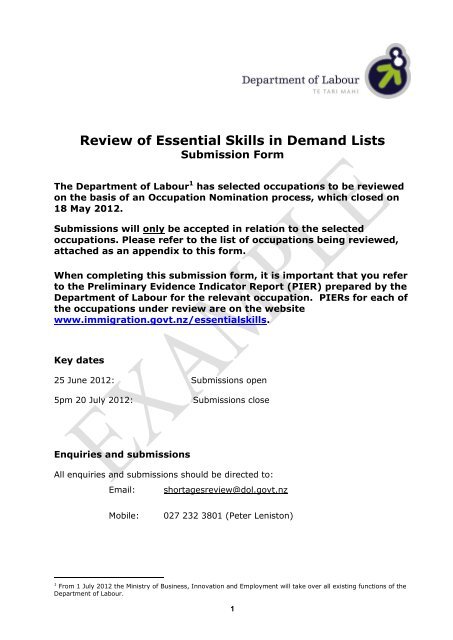
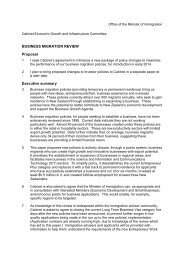
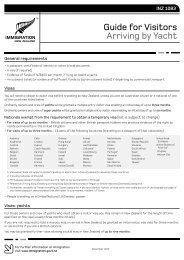
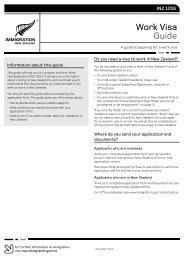
![Long Term Skill Shortage List PDF [200KB] - Immigration New Zealand](https://img.yumpu.com/15876707/1/184x260/long-term-skill-shortage-list-pdf-200kb-immigration-new-zealand.jpg?quality=85)
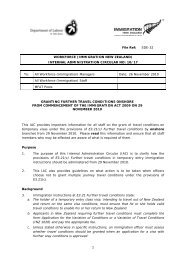
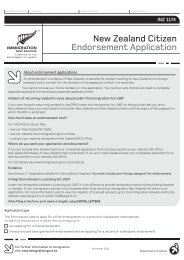
![New Zealand Residence Programme Fact Sheet PDF [161KB]](https://img.yumpu.com/14040475/1/184x260/new-zealand-residence-programme-fact-sheet-pdf-161kb.jpg?quality=85)
